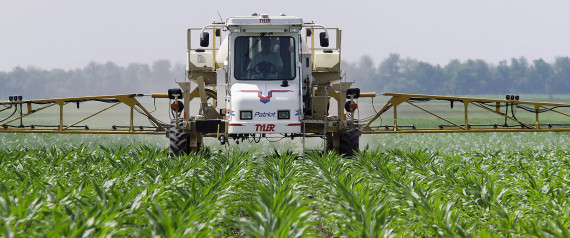
GMO Science Deniers: Monsanto and the USDA
Perhaps no group of science deniers has been more ridiculed than those who deny the science of evolution. What you may not know is that Monsanto and our United States Department of Agriculture (USDA) are among them. That's right: for decades, Monsanto and its enablers inside the USDA have denied the central tenets of evolutionary biology, namely natural selection and adaptation. And this denial of basic science by the company and our government threatens the future viability of American agriculture.
March 20, 2015 | Source: The Huffington Post | by Andrew Kimbrell
Perhaps no group of science deniers has been more ridiculed than those who deny the science of evolution. What you may not know is that Monsanto and our United States Department of Agriculture (USDA) are among them. That’s right: for decades, Monsanto and its enablers inside the USDA have denied the central tenets of evolutionary biology, namely natural selection and adaptation. And this denial of basic science by the company and our government threatens the future viability of American agriculture.
Third Grade Science
Let’s start with interrelated concepts of natural selection and adaptation. This is elementary school science. In fact, in Washington D.C. it is part of the basic third grade science curriculum.
As we all remember from biology class, when an environment changes, trait variation in a species could allow some in that species to adapt to that new environment and survive. Others will die out. The survivors are then able to reproduce and even thrive under the new environmental conditions. For example, if a drought were to occur, some plants might have traits that allow them to survive while other plants in the same species would perish. The drought-resistant plants then become the “evolved” species, and they are able to reproduce in the drought environment.
Obvious, you are thinking. But let’s explore how Monsanto’s top scientists and government regulators would have failed a third grade science class in D.C. and the dire consequences that it is bringing to us all.
Biotech’s Dirty Little Secret
First a little background. Since the early 1980s, Monsanto has endlessly hyped genetically engineered (GE) crops they claim could reduce hunger, reduce pesticide use, and survive droughts. In reality, no such “miracle” crops exist. No significantly greater yielding crops, no more effective drought resistance crops. And as for the claim of less pesticide use, behind this myth lies the “dirty little secret” of agricultural biotechnology. Namely, that GE crops actually add hundreds of millions of pounds of pesticides to our fields and crops, and create greater agrochemical residues on our food. Why? Because around 85 percent of all genetically engineered crops in the United States and around the world have been engineered to withstand massive doses of herbicides, mostly Monsanto’s Roundup. Usually, if toxic weed-killing chemicals such as Roundup come into contact with a crop they will destroy it as well as the weeds around it. But Monsanto scientists genetically engineered a cassette of bacterial and viral DNA into plants that allowed them to tolerate these herbicides. So the weeds are killed, but the crops remain.
In the United States, more than 50 percent of all our cropland is devoted to GE corn, soy and cotton. They are commodity crops that feed cars, animals in industrial meat production and are used for additives like high fructose corn syrup. Almost none directly feeds people. So rather than feeding the hungry, this technology is about chemical companies selling more chemicals, a lot more chemicals. So as noted, each year 115 million more pounds of Roundup are spread on our farmlands because of these altered crops.
